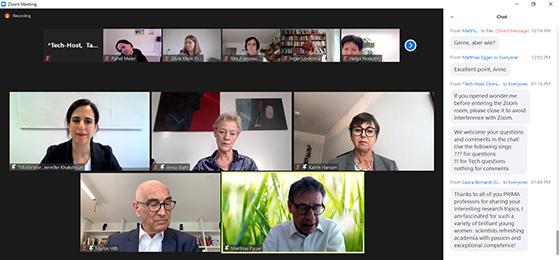PRIMA 2021: building bridges to change academia

The Advanced Leadership Dialogues took place on 22 March. The approx. 180 people following the SNSF event online were unanimous: academic leadership culture needs to change.
Society is facing a host of urgent challenges, with the COVID-19 crisis or climate change being the most prominent examples. What is needed to enable science and its institutions to contribute to the said challenges to the best of their ability? This question was at the heart of the event organised by the SNSF in the context of the Leadership Programme for PRIMA grantees.
The invited experts agreed that a new leadership culture is urgently needed. If universities and other academic institutions want to fulfil their role in shaping social change in the future, they need to establish new forms of collaboration and leadership. Women scientists will play a central part in this development.
To develop new forms of leadership and collaboration, we need to build bridges and give room to unconventional ideas, careers and experiences, argued Helga Nowotny, former president of the European Research Council in her keynote speech. She believes it would be important to re-evaluate current time structures in academia because "academic time differs between women and men." In her view, women should not have to adapt to a male-defined concept of time that leaves little room for maternity and care work. Quite the opposite:
"Women can bring their sensitivity to temporal structures in academia" and contribute to more diverse approaches and perspectives in research.
Her ideas resonated with the audience, prompting interesting questions and a lively debate. One of the participants asked how we can avoid a negative perception of schemes like PRIMA that devalues the work of the grantees and labels them as "token women". Helga Nowotny had a very encouraging reply: "You are good! Don't let anyone tell you that you are not entitled to your position and success." She believes that it is important that women don't take too much notice of such comments and perceptions. To strengthen this approach, she advocates that women build reliable networks because everything is easier if you stick together.
In the following panel debate, a diverse group of renowned experts debated the question of academic leadership. The participants included Matthias Egger (President of the SNSF Research Council), Anna Wahl (member of the SNSF Gender Equality Commission and Professor of gender, organization and management), Martin Hilb (President of the Swiss Institute of Directors and Professor emeritus of personnel management) and Katrin Hansen (Professor of organisational development and diversity management). The lively debate produced some interesting insights. The panel agreed that we have a lot of knowledge at our disposal on how to bring more diversity into academia but that there is a general reluctance to implement it. To change this, we need to be prepared to challenge certainties and ideals of how science works and use our creativity to find new ways. In addition, Anna Wahl and Katrin Hansen proposed a fundamental change in perspective: they argued that issues of leadership culture, diversity and gender equality should be at the heart of debates in general. Misplaced modesty should be replaced with a self-assured insistence on the importance of these topics.
The event also offered a stage to the PRIMA grantees. They moderated group discussions and raised pertinent questions during the plenary debates. With their confident contribution to the event they underlined their claim to a leading place in academia. Under no circumstance can science afford to lose these women, their curiosity, passion and leadership qualities. One of the aims of the annual Advanced Leadership Dialogues is to give visibility to the PRIMA grantees. By organising these events, the SNSF is highlighting the important contributions of women to science and to a new leadership culture.